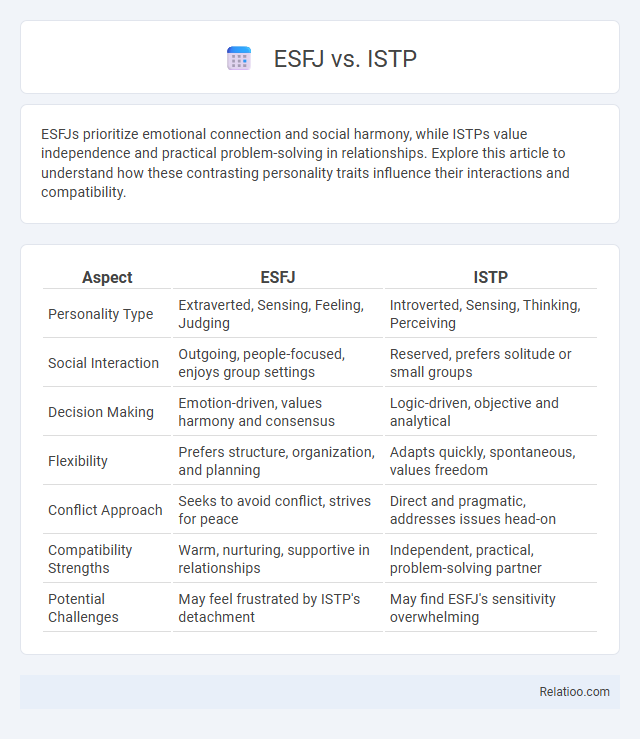ESFJs prioritize emotional connection and social harmony, while ISTPs value independence and practical problem-solving in relationships. Explore this article to understand how these contrasting personality traits influence their interactions and compatibility.
Table of Comparison
| Aspect | ESFJ | ISTP |
|---|---|---|
| Personality Type | Extraverted, Sensing, Feeling, Judging | Introverted, Sensing, Thinking, Perceiving |
| Social Interaction | Outgoing, people-focused, enjoys group settings | Reserved, prefers solitude or small groups |
| Decision Making | Emotion-driven, values harmony and consensus | Logic-driven, objective and analytical |
| Flexibility | Prefers structure, organization, and planning | Adapts quickly, spontaneous, values freedom |
| Conflict Approach | Seeks to avoid conflict, strives for peace | Direct and pragmatic, addresses issues head-on |
| Compatibility Strengths | Warm, nurturing, supportive in relationships | Independent, practical, problem-solving partner |
| Potential Challenges | May feel frustrated by ISTP's detachment | May find ESFJ's sensitivity overwhelming |
Overview of ESFJ and ISTP Personality Types
ESFJ personality types are characterized by their sociability, empathy, and strong organizational skills, often thriving in environments that require collaboration and nurturing relationships. ISTP individuals excel in hands-on problem-solving, independence, and adaptability, displaying a preference for practical and logical approaches in dynamic situations. Understanding your unique ESFJ or ISTP traits can enhance interpersonal chemistry by aligning communication styles and emotional responses effectively.
Key Differences Between ESFJ and ISTP
ESFJ and ISTP personalities differ significantly in how they approach relationships and problem-solving, with ESFJs focusing on harmony and social connections, while ISTPs prefer independence and practical solutions. Your ESFJ traits emphasize empathy and structured planning, whereas ISTPs are more spontaneous, analytical, and adaptable. In chemistry, ESFJs thrive in cooperative environments, but ISTPs excel when given freedom to explore and experiment independently.
Cognitive Functions: ESFJ vs ISTP
ESFJ's dominant Extraverted Feeling (Fe) drives their focus on social harmony and others' emotions, while ISTP's dominant Introverted Thinking (Ti) emphasizes logical analysis and problem-solving. Your ESFJ auxiliary Introverted Sensing (Si) reinforces practical memory and tradition, contrasting with ISTP's auxiliary Extraverted Sensing (Se), which enhances keen awareness of the present environment. Understanding these cognitive function differences reveals how ESFJs excel in interpersonal connections, whereas ISTPs thrive in hands-on, pragmatic tasks.
Strengths and Weaknesses of ESFJ
ESFJs excel in chemistry environments by leveraging their strong interpersonal skills, empathy, and organization, which enhance team collaboration and communication during lab work or group projects. Their strengths include attentiveness to others' needs, reliability, and practical problem-solving, but they may struggle with adapting to the independent, detail-focused, and sometimes unpredictable nature of chemistry experiments, where ISTPs often thrive due to their analytical thinking and hands-on approach. Weaknesses of ESFJs in chemistry may include difficulty managing unexpected experimental outcomes and a preference for structured environments over the exploratory and trial-error processes common in scientific research.
Strengths and Weaknesses of ISTP
ISTPs excel in practical problem-solving, independent thinking, and adaptability, often thriving in hands-on tasks and crisis situations, but may struggle with emotional expression and long-term planning. Your analytical mindset allows you to remain calm under pressure and quickly master technical skills, while potential weaknesses include a tendency to avoid emotional discussions and difficulty committing to routine or rigid structures. Understanding the contrast between ESFJ's social orientation and ISTP's introverted practicality provides valuable insight into effective communication and collaboration methods.
ESFJ vs ISTP: Communication Styles
ESFJs exhibit warm, expressive communication, focusing on harmony, social cues, and emotional support, while ISTPs communicate in a logical, concise, and action-oriented manner, prioritizing facts over feelings. The ESFJ's preference for verbal affirmation and communal interaction contrasts sharply with the ISTP's reserved, problem-solving approach, often leading to misunderstandings. Understanding these distinct communication patterns enhances collaboration by aligning empathetic listening with pragmatic dialogue.
Work Style: ESFJ and ISTP in the Workplace
ESFJs excel in the workplace through their organized, social, and cooperative work style, prioritizing harmony, team collaboration, and practical support to ensure group success. ISTPs prefer a flexible, independent work approach, focusing on hands-on problem-solving, adaptability, and logical analysis over social interaction or emotional considerations. In chemistry, these contrasting work styles can complement each other, balancing ESFJ's structured communication and empathy with ISTP's technical skills and innovative solutions.
Relationship Dynamics: ESFJ vs ISTP
ESFJs prioritize emotional connection and social harmony in relationships, often seeking clear communication and shared experiences, whereas ISTPs value independence and practical problem-solving, favoring a more reserved and flexible dynamic. The contrast between ESFJ's extroverted feeling and ISTP's introverted thinking creates a complementary balance, where ESFJ nurtures emotional warmth, and ISTP offers logical stability. Successful ESFJ-ISTP relationships thrive on mutual respect for emotional needs and personal space, blending sociability with adaptability.
Handling Stress: ESFJ Compared to ISTP
ESFJs handle stress by seeking social support and maintaining structured routines, which help them feel secure and understood, while ISTPs prefer to manage stress through solitary problem-solving and hands-on activities that allow them to regain control. Your ability to cope with stress may depend on whether you favor emotional connections and external organization like ESFJs or prefer independent, practical approaches typical of ISTPs. Understanding these differences can improve communication and reduce tension between individuals with ESFJ and ISTP personality types.
Growth and Development Tips for ESFJ and ISTP
ESFJs thrive by cultivating emotional resilience and embracing flexibility to adapt their strong social skills in diverse environments, fostering personal growth through mindful self-reflection and constructive feedback. ISTPs benefit from developing patience and enhancing interpersonal communication to balance their analytical and hands-on problem-solving strengths, promoting deeper connections and professional advancement. Both types can leverage understanding of chemical processes metaphorically to optimize personal transformation, emphasizing the importance of incremental change and continuous learning for sustained development.

Infographic: ESFJ vs ISTP
 relatioo.com
relatioo.com